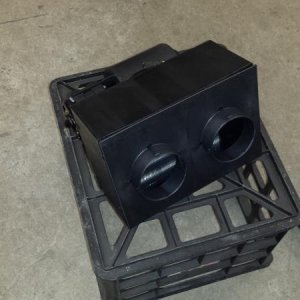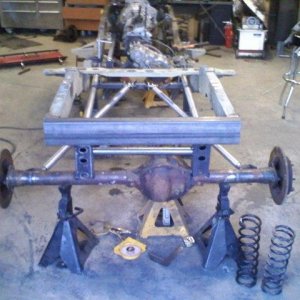I
InDaShop
Guest
The swabbies are at it now! 1/3rd of production is pirated. I love it!
http://www.chron.com/disp/story.mpl/front/5795467.html
May 21, 2008, 11:34PM
Grease pirates plunder tanks of old cooking oil
Former waste product can easily be transformed into biodiesel
By ALLAN TURNER
Copyright 2008 Houston Chronicle
Launching lightning raids under cover of darkness, slippery siphon-and-run grease pirates are taking the sizzle out of Houston's lucrative used cooking oil business â€" a once ho-hum trade that gained cachet as the restaurant waste became a prime ingredient in environmentally friendly biodiesel.
Richard McClere, owner of a small independent Houston grease-collecting business, estimated up to a third of the used oil he buys from restaurants is stolen before he can pick it up.
Shawn Griffin, Texas manager for the national Griffin Industries waste removal company, said record prices for grease have fueled record thefts â€" especially in Houston, the most grease pirate-plagued city in the state: "It's a huge problem, the worst I've ever seen."
Liquid gold
"We have a theft that happens almost every day," lamented Christina Tisdale of Quality Restaurant Services. Tisdale said her company replaced plastic tank lids with metal, but thieves broke them open. Then it fastened them with padlocks, and the thieves cut them off. Now, at substantial expense, the company has fitted its big tanks with metal barriers that make siphoning difficult.
In less than a decade, so-called "yellow grease," oil discarded after it was used to fry food, has been transformed from an unlovely restaurant waste to alluring liquid gold. Such oil, traditionally processed for use in animal feed, is a common ingredient in biodiesel. The cost of the soybean oil commonly used in restaurants has tripled in just three years.
Biodiesel fuel production last year grew to 500 million gallons, The Associated Press reported, up from just 75 million gallons two years earlier. In one recent year, the United States generated more than 700 tons of used cooking oil.
"Seven or eight years ago, restaurants paid us to haul it off," Tisdale said. "Now we pay them."
Rene Zamore, director of the Greater Houston Restaurant Association, said Wednesday that she was unaware of such thefts. But grease collectors argued there's been a theft problem as long as there's been a business.
Typically, cooking oil collectors sell their product to processors, who purify the oil before selling it to biodiesel makers. The yellow grease merchants offer differing theories of who the culprits might be.
"It could be an individual, what we call a 'night rider,' " Tisdale said. "It could be someone who owns a little pump truck and is licensed to pick up grease. It could be a farmer; could be kids. Nowadays you can convert your diesel truck to burn straight oil."
Small operators in a bind
Chris Powers, founder of Houston Biodiesel, a fuel retailer that also teaches customers how to brew their own, staked out high moral ground for environmentally conscious biofuel users.
"We hold homebrew workshops and sell a book that tells them how to make it safely," he said. "But we tell them clearly that taking oil from grease collectors is stealing. All of our students are well-educated about what that law says."
McClere, who opened his business nine months ago to cash in on the yellow grease boom, said small operators have no effective way to fight the thievery.
"You can talk to the police, and they'll say they'll watch the business for so much an hour," he said. "I can't afford that. You can set up security cameras, but they've got to be pretty high quality to catch a license plate. Who can afford that?"
McClere and Griffin complained that many people simply aren't aware of the old cooking oil's value, which recently sold for 38 cents a pound. "You'll see this in the newspapers all the time," Griffin said. "A person who's interested in producing his own fuel driving a VW bus across the country, just stopping by a restaurant to get the oil. That's a burr under our saddle."
"There's that myth about restaurants throwing it away," McClere added. "That it's just trash. I'll just take it and nobody's going to mind.
"Well, that's our livelihood."
http://www.chron.com/disp/story.mpl/front/5795467.html
May 21, 2008, 11:34PM
Grease pirates plunder tanks of old cooking oil
Former waste product can easily be transformed into biodiesel
By ALLAN TURNER
Copyright 2008 Houston Chronicle
Launching lightning raids under cover of darkness, slippery siphon-and-run grease pirates are taking the sizzle out of Houston's lucrative used cooking oil business â€" a once ho-hum trade that gained cachet as the restaurant waste became a prime ingredient in environmentally friendly biodiesel.
Richard McClere, owner of a small independent Houston grease-collecting business, estimated up to a third of the used oil he buys from restaurants is stolen before he can pick it up.
Shawn Griffin, Texas manager for the national Griffin Industries waste removal company, said record prices for grease have fueled record thefts â€" especially in Houston, the most grease pirate-plagued city in the state: "It's a huge problem, the worst I've ever seen."
Liquid gold
"We have a theft that happens almost every day," lamented Christina Tisdale of Quality Restaurant Services. Tisdale said her company replaced plastic tank lids with metal, but thieves broke them open. Then it fastened them with padlocks, and the thieves cut them off. Now, at substantial expense, the company has fitted its big tanks with metal barriers that make siphoning difficult.
In less than a decade, so-called "yellow grease," oil discarded after it was used to fry food, has been transformed from an unlovely restaurant waste to alluring liquid gold. Such oil, traditionally processed for use in animal feed, is a common ingredient in biodiesel. The cost of the soybean oil commonly used in restaurants has tripled in just three years.
Biodiesel fuel production last year grew to 500 million gallons, The Associated Press reported, up from just 75 million gallons two years earlier. In one recent year, the United States generated more than 700 tons of used cooking oil.
"Seven or eight years ago, restaurants paid us to haul it off," Tisdale said. "Now we pay them."
Rene Zamore, director of the Greater Houston Restaurant Association, said Wednesday that she was unaware of such thefts. But grease collectors argued there's been a theft problem as long as there's been a business.
Typically, cooking oil collectors sell their product to processors, who purify the oil before selling it to biodiesel makers. The yellow grease merchants offer differing theories of who the culprits might be.
"It could be an individual, what we call a 'night rider,' " Tisdale said. "It could be someone who owns a little pump truck and is licensed to pick up grease. It could be a farmer; could be kids. Nowadays you can convert your diesel truck to burn straight oil."
Small operators in a bind
Chris Powers, founder of Houston Biodiesel, a fuel retailer that also teaches customers how to brew their own, staked out high moral ground for environmentally conscious biofuel users.
"We hold homebrew workshops and sell a book that tells them how to make it safely," he said. "But we tell them clearly that taking oil from grease collectors is stealing. All of our students are well-educated about what that law says."
McClere, who opened his business nine months ago to cash in on the yellow grease boom, said small operators have no effective way to fight the thievery.
"You can talk to the police, and they'll say they'll watch the business for so much an hour," he said. "I can't afford that. You can set up security cameras, but they've got to be pretty high quality to catch a license plate. Who can afford that?"
McClere and Griffin complained that many people simply aren't aware of the old cooking oil's value, which recently sold for 38 cents a pound. "You'll see this in the newspapers all the time," Griffin said. "A person who's interested in producing his own fuel driving a VW bus across the country, just stopping by a restaurant to get the oil. That's a burr under our saddle."
"There's that myth about restaurants throwing it away," McClere added. "That it's just trash. I'll just take it and nobody's going to mind.
"Well, that's our livelihood."







![IMG_6225[1].JPG](http://attachments.www.hardlinecrawlers.com/xfmg/thumbnail/12/12433-337848a194275b34c6a58c82e25d2cae.jpg?1625929687)




![1_04_10_11_8_59_46_413[1].jpg](http://attachments.www.hardlinecrawlers.com/xfmg/thumbnail/0/531-a4ec4302a1a53fc3decb6a726e6eb1ea.jpg?1625928104)